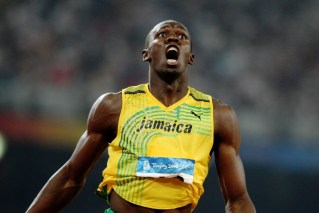Top Bronco’s key to success: Keep your head while those around you are losing theirs
Brisbane Broncos CEO Dave Donaghy would have us believe his success is a matter of being in the right place at the right time. This season will be the true test, writes Michael Blucher


Brisbane Broncos CEO Dave Donaghy has taken on a mammoth task this season (Image:ABC).
Most accomplished executives can nominate one, a sliding door moment that altered the trajectory or the direction of their professional life.
It might have been a chance meeting, or an unexpected phone call, even something a little untoward, like a missed flight or a flat tyre on the way to a job interview.
For “recently” appointed Brisbane Broncos CEO Dave Donaghy, it was the night in September 2008, that I distinctly remember Cameron Smith tying to rip Sam Thaiday’s head off.
A lot of water passed under the bridge after that, but the current set the dominoes in motion. If the Queensland and Melbourne Storm legend didn’t perform the uncharacteristically pugilistic act on his Maroons’ teammate in that spiteful semi-final at Suncorp Stadium, Donaghy isn’t sitting in the big chair at Fulcher Road, Red Hill, mapping out the club’s road to recovery.
But let’s rewind a little further. A lot further. Gladstone boy, the middle of three, grew up on the Central Queensland coast with not much more than love, support and a moral compass for navigating life’s future challenges.
Dave’s father, Paul, a “two pound pom”, worked in construction, not in an air-conditioned site office, directing tradies and traffic, but on the tools, in the Central Queensland heat, a rigid test for his once pale Birmingham complexion. Later in life, Paul Donaghy would secure a job as a deckhand for the local tug boat fleet, which would push and pull coal ships in and around the Gladstone port, “the deepest natural port in the world”, his son is quick to point out, just a little too enthusiastically. The Donaghys were and still are proud Gladstone-ites. And whatever you do, don’t confuse his beloved home town with Rocky – that’s like calling a Canadian a yank. Unpalatable.
One thing for sure, the $1.20 pots of XXXX that 18-year-old Dave drank in the Gladstone Port Authority bar on a Friday night, while chatting with his old man’s workmates, taught him pretty quickly about what was real in life and what wasn’t. He also schooled himself in how to talk “rugga-ba-leegue”. “What about them Broncos?”
Largely on account of Paul and Barbara Donaghy’s unselfishness and sacrifices, the three boys received the best available education – Dave, smart and sufficiently studious, enrolled in journalism and politics at UQ.
He harboured ambitions of being a “foreign correspondent” – ideally London-based, or somewhere in Europe, reporting on unfolding events in and around the world’s political and cultural hub. He was naturally curious as well as good with words – it seemed like a natural fit.
His early days in journalism saw him posted to Townsville, to head up Australian Associated Press’ North Queensland bureau. Rather curiously, that’s where he’d meet the first of quite a few Australian prime ministers.
On account of electoral dynamics in 2007, North Queensland was an important strategic battle ground. In the build up to the November election, John Howard spent a lot of time campaigning in the region.
Those mornings in Townsville, the Prime Minister would power walk along The Strand.
What the hell, Donaghy thought, “I’m going to tag along”. And he did, with surprisingly few others in toe, just the odd sweaty security guard. Up and back, up and back along the waterfront. The pair did quite a bit of chatting, the 23 year-old having to concentrate on his stride, just to keep up. “Cripes he walks fast!” Donaghy remembers.
The foreign correspondent plans were still on the radar when Donaghy was sent to Melbourne to cover sport for the Herald Sun newspaper, another career stepping stone.
In the AFL centric Garden City, his central Queensland origins made him a natural choice to cover rugby league, and all things Melbourne Storm.
Through those responsibilities, he got to know the club’s administrators and staff very well, everybody from the car park attendant through to the former CEO, Brian Waldron. That’s one of the golden rules of journalism – never dismiss a sole, embrace everybody, at all levels. Stories can come from the most unlikely sources.
Within the club, Donaghy was trusted and respected, far from a puffy PR operative, but somebody who loved the game, and for the sake of the code, wanted to see the Storm do well.
And then Cameron Smith tried to rip Sam Thaiday’s head off.
Just a couple of weeks shy of the NRL grand final, there was a crisis management exercise unfolding. The Storm skipper, the fulcrum of the club, looked for all money like being rubbed out of the “big dance” in a fortnight’s time. In the end, he was. Accusations of an anti-Storm conspiracy evolved into legal cases and, in the end, Donaghy was asked if he’d join to help calm the waters.
The assignment wasn’t exactly in Donaghy’s wheelhouse, but it piqued his interest. And got him thinking – Sports media and administration….that’d be good.
Soon after, Donaghy resigned from his media post and joined the Storm fulltime, looking after all things media, but also working under the well respected figure of Frank Ponissi in football operations – at Donaghy’s insistence. He wanted to learn.
Smith never played in the GF, but his over zealous grapple tackle had set Dave Donaghy on a new career path.
However, there was another twist just around the corner. Some 15 months later, the Melbourne Storm salary cap scandal broke. “What boat? I don’t know anything about a boat…Oh.. the one in my front yard….”
The fall-out was profound. Due to financial pressures, the Storm had to let most of their staff go. Donaghy was retained but he was pretty much flying without cover. Then Brian Walsh, the head of AFL corporate affairs came knocking on his door – there was role heading up ‘comms’ at the Brisbane Lions – “I think you’d be perfect,” Walsh enthused.
That was the beauty of working in sport in Melbourne – the people you met, and the relationships you forged. As much as monied old-school-tie Sydneysiders may beg to differ, Melbourne is the head office capital of Australia, the centre of our corporate universe.
After three years at the Lions, during a time the club seemed more focused on fighting internally than externally, Donaghy was enticed back to the Storm. Rugby league was his first love, but more importantly, he knew the learning and career opportunities were immense.
By the age of 32, he was the CEO, practical and astute, as well as politically and professionally nimble enough to navigate his way up and down the corridors of power, and in and out of boardrooms gnarled by the expectations of private ownership.
In late 2020, after he was ultimately accepted as the person to replace Paul White as the CEO of Queensland’s highest profile (and most heavily scrutinised) sporting franchise, Donaghy returned to Brisbane a very different professional to the one who’d left.
Seven years in the constant company of powerful, intelligent, ambitious people provided a rich and fertile field for learning, “a real life MBA on the run” was how he described it, although without elaborating, Donaghy concedes some of his best lessons came from what not to do.
Donaghy has now been in the chair at the Broncos seven months.
He is under no illusion as to the enormity of the challenges the club faces over the next couple of years – 16th and 14th on the ladder in the last two seasons paints a perfect portrait of where the club currently sits in the NRL pecking order. It’s not like they’ve been knocking on the door, they’ve been roaming around aimlessly in the wilderness, looking for somewhere to shelter. There’s a huge amount of ground to make up.
The first steps of that journey began with a distinctly different recruitment drive, orchestrated by new football manager Ben Ikin, in consultation with Donaghy and head coach, Kev Walters. As a result, 14 of last year’s first grade squad are no longer at the club – call It a culling, call it a clean out, call it what you like, but there’ll a different breed that’ll take the field for the club this season.
Topping that list, Adam Reynolds and Kurt Capewell, two highly experienced and respected players around whom the Broncos are expecting to rebuild the club culture.
Former Rabbitoh Reynolds is the consummate professional, calm and collected. Unflappable. With a wife and four children at home on his newly acquired acreage out past Samford, he’s at a stage of life where good decisions come more naturally.
Capewell is younger, a flint hard country type who’s won a premiership with Penrith and played Origin football. Having travelled out to south-west Queensland last week and spent time with the Capewell family on their sheep property outside Charleville (or “Kurtville” as the town is now called), Dave Donaghy is comfortable the club has recruited wisely. Rock solid people. Good decisions also come easily to Kurt Capewell.
In the first six months of his tenure, Donaghy has prioritised re-engaging with the Broncos “old guard”, including some of the more cantankerous and voluble who’ve been very public in their criticism of the club.
He’s been to Gorden Tallis’s place for a BBQ, even sounded out Barry Maranta and Steve Williams, two of the club’s founding fathers, to get their perspective of all things maroon and gold. “Bums on seats, Dave. It’s all about bums on seats, ” Maranta told him, slamming his glass of lemon lime and bitters on the table. Passion. And wisdom.
Like any good leader, in his first six months, Donaghy has spent a lot more time listening than talking.
Far from being offended by the strident criticism, he’s empowered by it – It means they care, deeply.
“I understand their concerns,” says Donaghy. “They care about the club and the results over the past few years haven’t been acceptable.
“The Broncos mean so much to them and to the city. Brisbane is a better place when the Broncos are up and about.”
Right now, he’s reluctant to get drawn into conversations about Redcliffe, and what their presence in the NRL will mean for the Broncos, any more than he’s prepared to dwell on the success he enjoyed at the Melbourne Storm. One’s in the future, one’s in the past, his focus is purely on the present.
Round One, 2022, Broncs v Rabbits.
“As a club, we don’t have expectations,” Donaghy says unguardedly, “Expectations in my mind point to a level of arrogance – like you’re somehow entitled. What we have is goals and our people, our systems and our processes that over time will be what ultimately delivers us results. What the players achieve as a group in 2022 depends on how hard they work, and what they’re prepared to sacrifice themselves, and for one another.”
Beyond that, the Broncos CEO is also worldly enough to know that sporting businesses, even more so than mainstream commercial operations, don’t spin around on a dime, like a 10 foot tinnie in Moreton Bay.
They’re much more like the heavily laden coal ships that his Dad used to shunt and shove on the tug boats, in and around the (very deep) port of Gladstone.
Progress can be painfully slow.
But the club’s monstrous band of avid supporters can rest assured, the shunting and shoving is well underway.












